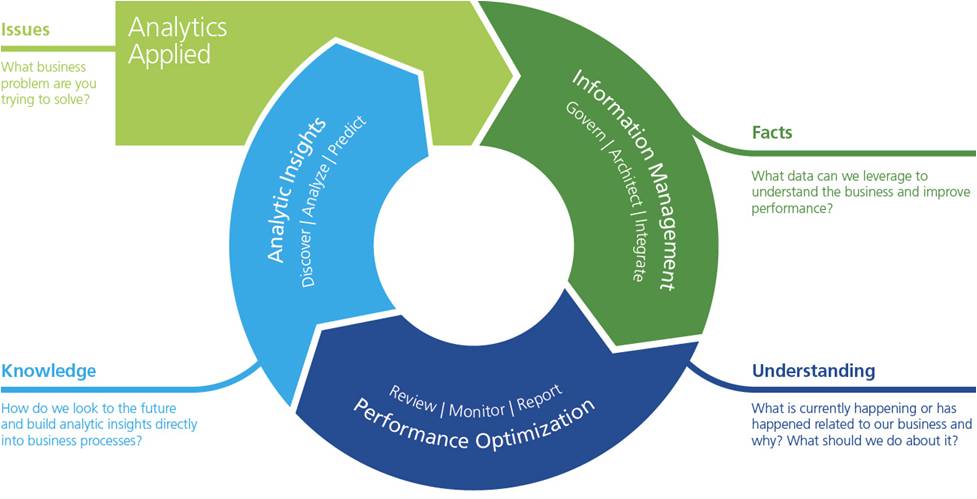What
Analytics is using data to generate
insights to make smarter decisions that drive strategy
and improve performance. Deloitte Analytics refers to
the skills, technologies, applications, and practices
for continuous iterative exploration and investigation
of past business performance to gain insight and drive
business strategy going forward.
A recent study
from MIT shows that on average the top performing
companies use analytics almost three times as much as
lower performing companies in everyday operations and
decisions. MIT Sloan Management Review and the IBM
Institute for Business Value.
Analytics: The New Path to Value How the
Smartest Organizations Are Embedding Analytics to
Transform Insights Into Action. 2010 What is
included in our view of analytics:

Why
Kennedy reports that the U.S. analytics
consulting market is growing annually at the rate of
7.5% and will be more than US$8B by 2014. Gartner
estimates the global analytics market to be US$50B+ by
2015. The availability of cheap computing, the
exponential growth of data, and the increased speed of
innovation all make analytics “the next big thing”.
The total global Deloitte Analytics opportunity
is estimated at US$5B by 2015. In 2010 we already have
about 4% of market share globally with revenues of
approximately US$1B.
Who
Deloitte Analytics is a global integrated
market offering. It drives substantial value for clients
while growing revenue and profitability. Our integrated
marketing offering is uniquely positioned to
differentiate Deloitte’s service offerings by our
unmatched global industry and domain knowledge.
Our people are key to a successful strategy and
we currently have about 3,000 practitioners globally
that work in Analytics. In order to meet our aggressive
revenue targets, Deloitte Analytics will need to have
over three times the number of people with analytics
skills by 2015. To put this into perspective, it is
estimated that at least one in every 25 hires over the
next few years will need to have analytics skills.
.jpg) |
Talent & Learning
As
client demand for analytics grows, so does need
for specialized talent. The Talent & Learning
team is developing, validating and deploying a
specialized competency and talent model as well as
a global curricula for each of Deloitte Analytics'
core capabilities to build global capacity and
rapidly scale to meet market demand. Our Talent
& Learning course resources are evolving
rapidly. Read
more. |
 |
Resources for developing
practices
Deloitte Analytics teams
start from a position of strength across global
regions and markets, as we leverage existing
resources, subject matter experts and functional
expertise. Regional
leadership, self-service education and
training and support from firms in established
markets serve as a platform for emerging markets
during the rapid growth of our practice. Connect
with Deloitte networks across the globe, find case
studies support materials across industries and
functions and hhear
analytics leaders present thought pieces,
predict trends and establish guidelines for
practice growth. View
additional resources.
|
How
Addressing "heart of the business" issues is
crucial in projecting a highly relevant value
proposition to clients, and to retaining and extending
our market leadership. Deloitte Analytics will focus our
industry expertise, analytics capabilities, and
understanding of decision-makers' roles in developing,
enhancing, and scaling offerings and solutions across
the following domains:
Customer
Analytics provides clients with actionable
insight on their customers – past, present, and future.
These insights often result from forming a single,
expansive view of customer relationships and behaviors
across previously siloed products and channels. Armed
with the new insights, clients can discover previously
hidden up-sell and cross-sell opportunities, flag early
signals of customer defection, and obtain better returns
from marketing campaigns.
Supply
Chain Analytics empower clients with
insights on demand patterns, supply and distribution
networks, and customer service requirements across
transactional and operational systems. In a volatile
economic climate, and in the context of increasing
globalization, analytics can help clients to cut
procurement costs, identify anomalies and potential
disruptions, forecast demand more reliably, optimize
logistics, and gain a holistic view of their entire
supply chain.
Finance
Analytics help clients to manage
performance in alignment with their business strategy.
By helping clients get control of their financial data,
finance analytics enable clients to model business
processes and gain deeper insight into cost and
profitability drivers. Plans, budgets, and forecasts
become more accurate, and clients can better understand
the significance of KPIs - and their true relationship
to performance.
Workforce
Analytics help employers improve their
workforce management processes by linking their HR
strategy to analytical techniques. In an ever more
diverse and decentralized workforce environment,
insights gained from workforce analytics can help
managers find ways to recruit – and retain – world-class
talent, and address other data-driven workforce
challenges such as employee safety.
Risk
and Regulatory Analytics help clients to
understand their risk exposure better, and to
proactively identify and mitigate sources of risk on an
enterprise scale. Armed with this information, executive
management and boards will be better equipped to
navigate challenging economic conditions, and complex
legal and regulatory environments, with the insight and
foresight that only analytics can provide. >